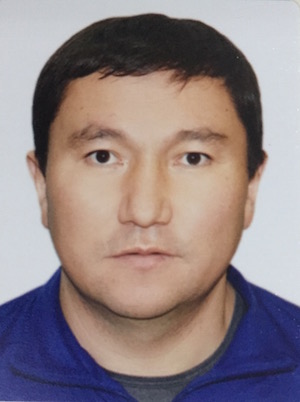 Nurbek Toichubaev
Nurbek Toichubaev
Founder and CEO
Invivo LLP, Almaty, Kazakhstan
Young Leaders Program (’03)
Please tell us about your career path so far. What is your area of specialization and how did you come to work in this area?
After returning from Japan in 2003 I started working at “Informative Future”, a foundation that was aiming to develop centers of public Internet access in rural areas. During the three years that I worked there we were able to create over fifty Internet access points in the rural areas in Kyrgyzstan.
In 2007, I decided to start my own business and established a company in medical laboratory diagnostics. We specialize in diagnosis based on the results of laboratory analyses, including microscopic, bacteriologic, or biopsy studies
You are currently CEO of Invivo LLP a medical laboratory company providing diagnostic testing services. Please tell us more about the company and your main responsibilities and duties.
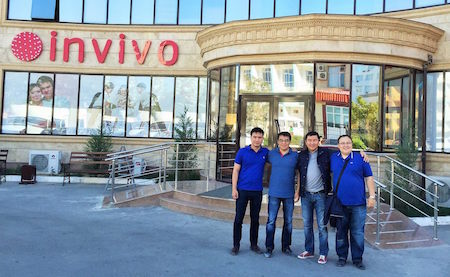
Nurbek with some co-workers during a site visit to one of the Invivo labs.
The company was established in 2007 in Almaty. From the very beginning we decided to be engaged in diagnostics, because there was a need for complex and precise diagnostics after the collapse of Soviet Union and the breakup of its health care system. Realising there was a huge gap in the system and driven to make things better we made up our minds and decided to occupy this niche. Invivo is the first private company in Kazakhstan that has started to implement the American model of one central laboratory combined with many local biomaterial or blood sampling reception centers. We provide our services not only to medical institutions and doctors, but also to people wishing to receive preventive or diagnostic services for various health problems.
I have been running this business from the very start and have actively participated in the process of determining the development strategy. As Director, I am responsible for overseeing and supervising the day-to-day operations and for meeting the company’s goals.
In your current capacity, what do you see as the main opportunities and challenges for your company over the course of the next five to ten years?
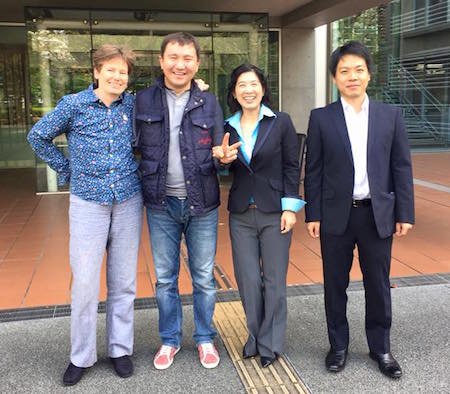
Nurbek visited GRIPS during his latest business trip to Japan in November 2015
We plan to focus our attention on the development of diagnostics orientation – the functional and visual diagnostics that includes the use of MRI, CT scans and other advanced techniques will be expanded.
In the near future we are going to increase the number of such centers to up to twenty. At the same time, we are developing a network of the so-called “walking distance medical clinics”. The number of those is expected to reach seventy during the next few years. In the longer term, after the completion of these projects, we will consider developing and opening hospitals with different profiles.
Please tell us about your company’s cooperation with one of Japan’s leading clinical laboratory testing companies. How has your experience at GRIPS prepared you for your current endeavours?
Three years ago we started working with a Japanese laboratory called SRL. SRL has some forty years of experience in clinical laboratory testing and is the biggest such company in Japan, and the fourth largest in the world. We started a joint project on implementing and developing a system for control of laboratory tests quality, as well as elements of a Kaizen system. We are still working together and hope this cooperation will evolve into a strategic partnership between our companies. Under the VDP project (visual diagnostic project is a type of visual and functional diagnostics like MRI (magnetic resonance imaging) and CT scan (computer tomography)) we have signed an agreement for the supply of MRI and CT equipment. The estimated cost of the project is around 30 mln USD.
GRIPS has helped me to make friends and professional contacts throughout the world. With many of them I still have close connections, and they have helped me with the implementation of the projects in their countries. Additionally, my one-year Japan experience has given me the understanding of the peculiarities of the Asian culture and mentality that helps me in doing business in Asian countries.
What are some of the biggest challenges you face in your work? And what have been the most interesting or rewarding aspects of your career thus far?
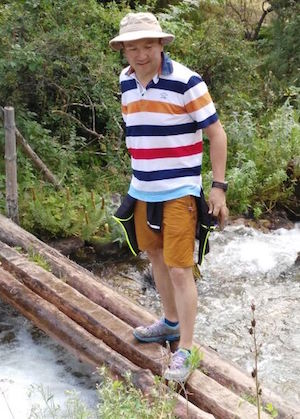
Always active!
Like many others I have to deal with incomprehension and misunderstanding of people. At the very beginning I used to know all the employees and even the names of their family members. However, since our company’s rapid expansion the situation has changed. It’s pity, but I no longer know all the staff because the number of employees now is over 3000, and it’s simply impossible to know everyone. However, at the same time, the fact that we have been able to build this up makes me feel proud. Another thing that I treasure a lot is the fact that about 99% of people who leave the company go with gratitude regardless of the reasons for leaving.
You only have one arm but that doesn’t seem to have stopped you from living a life more active than most. Were you born like this and has it affected your life or your plans for the future in any way?
It’s not a congenital disorder, but the result of an accident when I was 13. Did it impact on my behavior? Of course, yes, because I had to double my efforts to get things done. For instance, I had to learn writing again from the beginning. But altogether this has made me a much stronger person.
You recently won the Bronze Medal at the World Paratriathlon Championship in Chicago, USA. Congratulations! When and how did you get engaged in this sport? And what more do you hope to achieve?
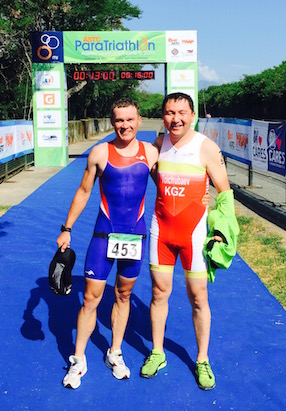
After finishing fifth in the Paratriathlon Asian Championships 2015 held in the Philippines.
Thank you very much. That was a very special occasion in my life, when my whole country was proud of me. I have always been close to sports, especially to team sports. In the fall of 2014, I started going to the gym just to keep in shape. But it was a bit boring. Almost by chance I learnt and discovered the wonderful world of triathlon. I fell for it immediately and have been in love with this sport since. Meanwhile, I realized that there are many opportunities to represent my country in international Paralympic competitions. In the past year, I participated in a few international competitions. I would like to mention my fifth place in the Asian Championships in the Philippines.
I will continue to participate in such events, and my main goal and dream is to participate in the Paralympic Games in Tokyo in 2020.
What led you to GRIPS? What is the most important thing you got out of your studies here?
My first term paper at the university during my undergrads was related to the economy of Japan. And the first book about Japan I read was “15 Stones of Ryoanji Garden”. My love for and feelings towards Japan might have emerged from those moments. When I learned of a possibility to study in Japan, and at GRIPS in particular, I did not hesitate to apply. I subsequently passed all the selection procedures and was admitted in 2002.
My studies at GRIPS forced me to switch from the Soviet system to the international one (from one where professors take care of students to a system where everyone is responsible only for him/herself). GRIPS helped me to get accustomed to work independently. The study gave me a better comprehension of the world economy and of Asian politics. But the most valuable thing I learned and came to understand were the people and the atmosphere I was surrounded by during my study.
What is your fondest memory of your time spent at GRIPS? And what do you miss about Japan?
Honestly, I cannot distinguish a certain moment, because the whole period of my stay in Tokyo was full of bright and unforgettable events. The study at GRIPS was a unique chance for me to get good education, meet wonderful people, and get to know the culture of that beautiful country, Japan. I miss the Japanese accuracy, credibility and life infrastructure very much. I miss the real Japanese cuisine, and even the busy life which is felt everywhere.
How do you maintain a balance between your work and the rest of your life? And what is your favorite thing to do when you are not working?
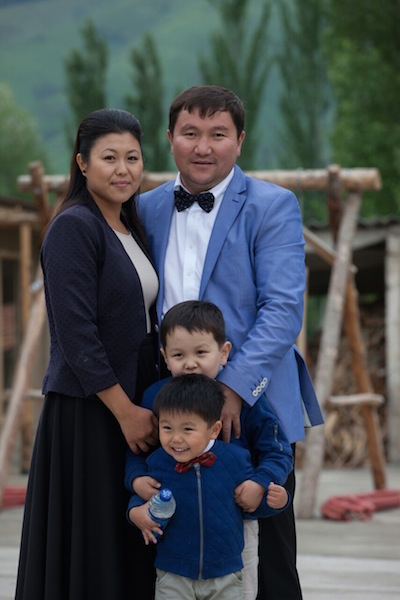
Nurbek with his wife and two sons.
Since I am a higher-level manager, I have quite a bit of flexibility in planning my schedule. Usually, I start the day with a morning run. I go to the swimming pool during the lunch break and for a bicycle ride in the evening. I spend the weekends with my wife and children.
If you could give one piece of advice to anyone considering studying at GRIPS what would it be?
Studying in Japan and at GRIPS is a unique, life-changing, experience. If you get a chance to be part of this, don’t hesitate and jump on it! You should also be open-minded and be ready to change, first of all, yourself, because your habits and culture will differ from the environment you are going to find yourself in Japan. And you should be well prepared in terms of language and basic knowledge, because the study starts almost from the very first day. And if you go to Japan do not sit at home but emerge yourself in the local culture and try to experience as much as you can. You should learn Japan from all sides. It is an insanely interesting country.
How would you like to maintain involved with the School? What do you expect from GRIPS as an alumnus?
I would like to hear news about fellow alumni and GRIPS professors and stay informed of all significant events of the university.
Do you have any suggestions on how to further utilize the GRIPS alumni network?
It is necessary to hold reunions of graduates from time to time. I still keep close relations with those people I met in Japan and became close friends with. But there are people, who for some reason, got distanced. Therefore, GRIPS may need to create more platforms for communication to get a greater number of graduates involved.





